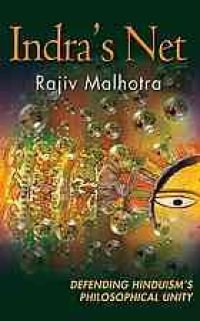
Ebook: Indra’s net : defending Hinduism’s philosophical unity
Author: Rajiv Malhotra
- Genre: Religion
- Tags: Hinduism -- Doctrines, Philosophy Indic, Vedas -- Atharvaveda -- Criticism interpretation etc, Vedas -- Atharvaveda, Philosophy Indic, Hinduismus, Philosophie
- Year: 2014
- Publisher: HarperCollins Publishers India
- Language: English
- epub
Introduction:
Debating Hinduism
Overview
This book is about the ongoing battle over Hinduism’s positioning on par with the world’s major religions. It rebuts an increasingly powerful school of thought amongst the academia, which
posits that Hinduism, as such, has never existed. What is popularly considered to be Hinduism today is dismissed as a potent myth concocted by Swami Vivekananda, who supposedly appropriated and
repackaged Western concepts and practices as part of a nationalist project. Moreover, it is alleged that this project has produced many of the social ills found in India today.
This battle is not merely a philosophical debate. The ramifications of a discourse that pits contemporary Hinduism against its hoary past are profound and terrifying. The claim made by my
opponents that there is no such thing as Hinduism—regardless of the name we might choose to assign it—simply denies the existence of an integrated unified spiritual substratum in ancient
India. This battle, therefore, is also an intellectual one, with implications for the very survival of Hinduism as a tradition with a rich past, to be understood on its own terms.
The school of thought I debunk here represents an insidious, subtle, but nevertheless powerful, form of colonialism and conversion. Indeed, no explicit act of ‘conversion’ is even
necessary; one is systemically re-programmed to believe that one was never a Hindu in the first place, and that the things one cherished about Hinduism all along were simply a repackaged
collection of Christian and Western secular beliefs and values. Thus, one is made to feel that one loses nothing by abandoning Hinduism other than the term itself.
This pernicious ploy is used to create fissures in Hindu society by pitting the spiritual giants of Hinduism against one other, and to distort their subtle and deeply intricate viewpoints. The
book not only disproves this dangerous line of thought; it offers a new framework in which to understand and interpret Hindu identity that is broad and yet well-defined, authentic and yet
accessible, embracing both the traditional and the contemporary.
============::::::::::::::::::::::::::::::::::============
Please buy the book and encourage the Author and his Tapas
============::::::::::::::::::::::::::::::::::============
Debating Hinduism
Overview
This book is about the ongoing battle over Hinduism’s positioning on par with the world’s major religions. It rebuts an increasingly powerful school of thought amongst the academia, which
posits that Hinduism, as such, has never existed. What is popularly considered to be Hinduism today is dismissed as a potent myth concocted by Swami Vivekananda, who supposedly appropriated and
repackaged Western concepts and practices as part of a nationalist project. Moreover, it is alleged that this project has produced many of the social ills found in India today.
This battle is not merely a philosophical debate. The ramifications of a discourse that pits contemporary Hinduism against its hoary past are profound and terrifying. The claim made by my
opponents that there is no such thing as Hinduism—regardless of the name we might choose to assign it—simply denies the existence of an integrated unified spiritual substratum in ancient
India. This battle, therefore, is also an intellectual one, with implications for the very survival of Hinduism as a tradition with a rich past, to be understood on its own terms.
The school of thought I debunk here represents an insidious, subtle, but nevertheless powerful, form of colonialism and conversion. Indeed, no explicit act of ‘conversion’ is even
necessary; one is systemically re-programmed to believe that one was never a Hindu in the first place, and that the things one cherished about Hinduism all along were simply a repackaged
collection of Christian and Western secular beliefs and values. Thus, one is made to feel that one loses nothing by abandoning Hinduism other than the term itself.
This pernicious ploy is used to create fissures in Hindu society by pitting the spiritual giants of Hinduism against one other, and to distort their subtle and deeply intricate viewpoints. The
book not only disproves this dangerous line of thought; it offers a new framework in which to understand and interpret Hindu identity that is broad and yet well-defined, authentic and yet
accessible, embracing both the traditional and the contemporary.
============::::::::::::::::::::::::::::::::::============
Please buy the book and encourage the Author and his Tapas
============::::::::::::::::::::::::::::::::::============
Download the book Indra’s net : defending Hinduism’s philosophical unity for free or read online
Continue reading on any device:

Last viewed books
Related books
{related-news}
Comments (0)